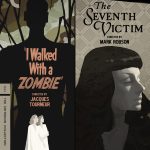Failed comedian Arthur Fleck meets the love of his life, Harley Quinn, while in Arkham State Hospital. Upon release, the pair embark on a doomed romantic misadventure.
Chuck says:
Currently standing at only 33% positive on the Rotten Tomatoes movie review website, I’m a bit mystified by the critics who are slamming “Joker 2: Folie a Deux.” Though some have been consistent in their approach to both the first film and this one, there are quite a few who seem surprised that the follow up is dark in tone, deals with controversial social issues and isn’t concerned with being a fan service movie. Did they not see the first film?
Todd Phillips is nothing if not consistent with “Deux,” a daring sequel that plumbs further into the uncomfortable themes brought to the fore in the 2019 blockbuster and has the strength of its convictions to put the stigma surrounding mental health in the spotlight. Perhaps more audacious is his and fellow screenwriter Scott Silver’s willingness to confront some of the controversy surrounding the first entry in regard to what the Joker represents. The intention here is not to cater to corporate expectations, as this is far from a by-the-numbers superhero entry but rather to take a bold look at the sway the media holds on public opinion and the power of the human mind to delude itself.
The action picks up some two years after the Joker’s (Joaquin Phoenix) appearance on “The Murray Franklin Show,” which led to the host’s death and widespread rioting in Gotham City. With his trial about to begin, Arthur Fleck (Phoenix as well) is resigned to his fate, not interested in putting forth much of a defense. That is, until he meets Lee Quinzel (Lady Gaga), a fellow inmate at Arkham Asylum. Kindred souls, they have an immediate connection and soon Fleck finds the will to go on. Eager to be vindicated so that he might be set free to start life anew with his psychotic lady love, he slowly starts to assume the identity of the Joker once more. Its obvious this is the part of him Quinzel is attracted to, as is an ever-growing group of supporters who see the maniac as a symbol for all those forgotten and oppressed by society.
It’s established early on, with a wonderful parody of a Looney Tunes Cartoon, that Fleck and the Joker are two distinct personalities. The pull between them is at the core of the film, and while Fleck is fully aware of right and wrong, his attraction to Quinzel seduces him to succumbing to his dark side so that he may be the disrupter she’s attracted to.
The interplay between the two leads has the necessary spark needed to make their twisted relationship convincing. Phoenix and Gaga’s off-beat personae perfectly compliment their characters and the stories dark storyline. Both needing to escape from the miserable lives, the viewer is privy to elaborate song-and-dance numbers that take place in their minds, each expressing their passion for each other. Thankfully, these tunes are from the Great American Songbook, standards such as “I Got the World on a String,” “If You Go Away,” and the like, all solid choices, sincerely rendered. However, what starts as an interesting novelty gets old very quickly as these numbers are far too frequent, bogging down the story and robbing the film of narrative momentum.
Examining how the Joker is perceived is the movie’s strongest suit, as this innocent man has become an unexpected symbol of anarchy, embraced by the masses craving for a sense of validation. In Fleck, they see themselves – abused, downtrodden, brushed aside. And in the Joker, they see who they want to be, a figure willing to upset the status quo, regardless of the cost, who loudly proclaims that he and anyone society would rather forget, deserve to be recognized. Of course, the truth is, those who follow the Joker have little to nothing in common with him and are simply projecting what they need from a champion on a willing mirror of a man. Whether this is a reflection of a certain candidate for the highest office in the land and his followers, I will leave to you.
Phillips and Phoenix’s sympathetic approach to Fleck is what gives the film its power and relevance. As with the first entry, this is a plea for services for those suffering from mental illness, a responsibility our country has been negligent in addressing. In making this its focal point, “Joker: Folie a Deux” is the most daring film to come out of a Hollywood studio this year, a movie that bravely takes a stand and defends it, regardless of how it may be perceived or its profitability. To be sure, it’s a hard watch, but there’s much to be admired here and its message is one that we ignore at our peril.
3 1/2 Stars




